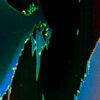Men arrive on crutches, two in wheelchairs, through a wintry dusk at the monumental neo-Renaissance opera house in Lviv, Western Ukraine – built for the capital of the then autonomous province of Galicia between 1897 and 1900. Some hundred seats tonight have been reserved for serving soldiers, who enter the lobby – a fin-de-siècle wonder – in military fatigues. They check these in, so that the coat check looks like a barracks locker room. A contingent of some forty cadets from the city’s emergency firefighting department duly arrives, disarmingly young. For most, it’s a first night at the opera.
The occasion marks the anniversary of Russia’s full-scale invasion of Ukraine – a concert dedicated to the troops who have fallen during this first, monstrous year of war, and the innocent civilian lives lost. But also to ‘The Invincible’: homage in music to Ukraine’s noble cause and just war. The programme is Bucha. Lacrimosa by Victoria Poleva, composed in commemoration of the victims of atrocities in that town during the early weeks of the war, followed by Giuseppe Verdi’s epic Messa da Requiem. The stage is blackened, and on each flank red roses are arranged and affixed so that petals fall towards the ground. A bunch beneath the conductor’s podium is upside down, an inverted bouquet of flowers tumbling towards, rather than growing from, the earth.
Before the curtain, an announcement: ‘In the event of an air raid or siren, we ask you to adjourn to the shelter. If the air raid warning lasts less than an hour, the performance will resume.’ Orchestra and choir take their places, followed by Canadian-Ukrainian conductor Keri-Lynn Wilson, creator of the international Ukrainian Freedom Orchestra.
Bucha. Lacrimosa opens with hushed percussion, conjoined by solo violin – desolate and sparse throughout. Verdi’s Requiem is terrifying at the best of times, and tonight Wilson achieves something strangely cogent: the notion of ‘restrained Verdi’ should be oxymoronic, but it turns out not to be. Subdued solemnity from the start; Verdi’s cry against the outrage of death is shattering for the usual reasons, but focused by uncanny understatement entirely appropriate for this occasion.
The young fighters and firefighters are enthralled. During the day, through the doors of the former Jesuit – now Greco-Catholic – church wherein military funerals are held, coffins were carried in by their comrades, for benediction, then back down the steps, accompanied by a dirge from a military band and followed by young widows and scores of other mourners in tears. The same had happened the day before, and the day after. Now, Verdi’s unforgiving ‘Dies Irae’ erupts from Wilson’s discreet sonority, a swirl of acceleration and deceleration; mezzo-soprano Anastasiia Polishchuk’s delivery piercing the air, and with it her audience’s collective heart.
At the end, bouquets of roses presented to the lady soloists and conductor are peace-white rather than blood-red, and Wilson picks hers apart, stem by stem, throwing each flower to the military sitting in rows A to F. There are photos of ranked soldiers and firefighters on the foyer steps in front of a portrait of Solomiia Krushelnytska, the great Ukrainian soprano. Then out into the night.
Two evenings later, a different but no less impactful event: a new opera by Ukraine’s prominent composer Yevhen Stankovych, The Terrible Revenge, based on the Gothic horror story by Nikolai Gogol, born in Poltava – then part of the Russian empire, afterwards the USSR, now Ukraine. Significantly, the libretto, by Stankovych, is a resetting for stage in Ukrainian of Gogol’s original Russian prose.
Here is a dark masterpiece of cruel but cathartic prescience, composed – and the production designed by the Germans Andreas Weirich and Anna Schöttl to commemorate Stankovych’s eightieth birthday – before the Russian invasion. The story concerns the Antichrist, poisoning love and unleashing violence at an intimate level: he is also the father of the heroine, Katerina, whom he violates and murders. But it is also about the final defeat of this monster, hurled into an abyss by a young boy.
In several images during this war – including an anniversary postage stamp reproducing a mural by the British street artist Banksy – Ukraine has been portrayed as child David felling Russian Goliath. ‘Now,’ writes composer Stankovych in a programme note, ‘all of this resonates with our reality, and what is happening.’
The work is conceived and performed on an epic scale; three long acts, Gogol’s quotidian setting being used to deal with apocalyptic themes. Chiaroscuro lighting isolates the characters in a voluminous umbra. Stankovych’s orchestration is vast, deep and dense, and especially remarkable for its use of woodwind. Katerina is like the great heroines of Leoš Janáček’s operas, but – Stankovych says in conversation later – ‘with a metaphysical dimension, between worlds, in Gogol’s story, accompanied by her spirit character’. There is a dreadful but moving scene wherein she laughs, possessed, then dives into bunches of lilies, at once symbols of her marriage and the Annunciation. She is drowned by her sorcerer/father in a bath of water blessed in another scene, but her previously abducted child reappears, hiding behind a cradle, to overthrow the Antichrist.
‘For the first time ever,’ reflects the opera company’s literature and drama director Alina Plakhtiienko, ‘I ask myself: is this a time to play and hear music, with so many people dying? But I realise: there is no right or wrong time for music. Russia is trying to destroy our country and our culture, and so long as music is played in Ukraine, they will have failed in this. We still have culture, and therefore our nation.’ We are talking in an elegant room at the theatre, once the private cabinet of Emperor Franz Joseph I, with its own bathroom and door into the royal box.
Of these two unforgettable performances, Plakhtiienko says: ‘These were occasions on which to step back from our lives of daily tragedy, and think in music about those soldiers who died for our independence, and all victims of this Russian terror, especially the children. Verdi’s Requiem needs no explanation. And The Terrible Revenge conveys exactly what is happening now and, in its title, what we want: revenge against our enemy.’
Nights at the opera in Ukraine – where everything, including every kind of music, has changed.
Andriy Khlyvnyuk and his group take a break. This is not Andriy’s band with which he plays as Ukraine’s most famous rock star, but a unit of fighters from the front line.
Andriy is the songwriter and vocalist for Boombox, Ukraine’s best-known band over the past two decades, recently launched to international stardom after a collaboration with Pink Floyd, with whom Andriy recorded, in April 2022, a searing rendition of ‘Oh the Red Viburnum in the Meadow’, a Ukrainian patriotic march of 1875, reset to music during the First World War. It goes: ‘In the meadow a red viburnum bends down low / Our glorious Ukraine is troubled so / We’ll take that red viburnum and will raise it up / And our glorious Ukraine shall, hey, hey, rise up . . .’ Andriy recorded the vocal track in Kyiv, wearing camouflage and a New York Yankees cap, for Floyd’s superstars David Gilmour and David Mason to accompany from London, under the title ‘Hey Hey Rise Up’.
‘This is my other band,’ Andriy beams this evening, waving an arm around the company at the bar, enjoying beers in Kyiv, grateful for the intermittent electricity. Almost immediately after the Russian invasion, Khlyvnyuk joined the volunteer unit of the patrol police, TOR, or Tactical Reaction Operations. This is no normal police beat: Andriy proudly shows a video of his patrol crew in combat fatigues on the front line, deploying a Punisher drone against the enemy. The remote-controlled glider can discharge munitions at a distance of up to thirty miles. The video shows the Punisher unleashing a bomb on a Russian tank. ‘I call it a Ukrainian parking ticket,’ Andriy laughs. ‘Your vehicle is illegally parked in our country!’
Khlyvnyuk orders another round and introduces the ‘band’. There is Zhenya, a professional soldier during the Russian annexations of 2014, and expert sniper, now returned as a volunteer. Miro is Ukrainian-American, a former US Marine from Los Angeles who has served in Afghanistan. Serhiy will only touch soft drinks, and says little; he’s mostly on his mobile phone. The unit commander, Leonid, passes by the bar to say hello. Girlfriends arrive and talk shifts from war to music and love – until curfew at 11 p.m.
The world has been stunned by the courage and efficacy of Ukraine’s resistance fighters. But few of these are professional soldiers: most are yesterday’s taxi drivers, plumbers, computer programmers – and musicians. People who until February 2022 were singing into microphones, spinning discs, playing clarinets or guitars, are now learned in the arts of war. Overnight, they have become perhaps the most formidable fighting force in the world. Andriy Khlyvnyuk is one of them.
Andriy has a way of entwining stardom with humility; his manner mischievous and straightforward. In Kyiv Andriy must stop every few yards to pose for pictures; it takes us twenty minutes to get through a street market on a winter’s day when seven missiles hit the capital city.
‘Here I am trying to eliminate my own public,’ Andriy tells me. ‘Eighty per cent of our sales were in post-Soviet Russia. We won the biggest Russian music awards. These people bombing Kyiv today danced with their fiancées to my songs at their school graduations and weddings. These same men are now here trying to kill us, and I am trying to kill them.’
I ask Andriy: was it hard to shift from being the country’s most famous rock star to a soldier under orders? ‘I thought it would be,’ he reflects. ‘I was afraid of the brutality, noise and dirt of war. But it wasn’t – it was surprisingly easy.’ Why? ‘Look, if I was sent somewhere to fight, I’d be useless, terrified; I don’t want to kill or be killed. But that’s not what happened. They came for our streets and our children’s playgrounds.’
Khlyvnyuk makes the point by referring to the manager of the band, Oleksiy Sogomonov, from Makariv, scene of heavy fighting in the war’s early stages. ‘Our guys were confronted by the Russian airborne forces. We kicked the shit out of them. Oleksiy grabbed a tank and neutralised it, and was nominated for a medal. Just imagine: this foxy punk gets decorated without even leaving his own neighbourhood! He was fighting for his own home. They came for our houses, and turned people like Oleksiy into war heroes.’
Andriy explains his motives for joining the TOR. ‘Music is a universal language. But music also comes from where you come from; it reflects on the feeling of home, and what home means – and on the obligation to protect your family, your neighbour. Anyone who grew up to learn their language, and their poets and music by heart knows to say to the empire, any empire: “You will not do this to us.” ’ He recalls the time his unit ‘went into Bucha when our army was pushing forward, and we saw our people – kids, wives, fathers – killed for their phones or cars, lying there, being eaten by their own starving dogs. So: what does it mean to be a human being when he or she finds themselves looking at this, or in trench warfare? This is not some natural disaster in Ukraine – this is being done to us. You have two options: run, or fight back.’
The war, he says, began in 2014 after the annexation of much of Donbas and Crimea. ‘That’s when Boombox stopped playing in Russia, unlike many others – young bands who couldn’t resist the market. Since then, there’s been a sense of the storm coming. But who’d have thought that our audience, those people who cried, laughed and danced to our songs would come to kill and rape us. That’s the shock. It’s beyond good and bad, it’s even beyond irony. When this war is over –’ he pauses to consider the possibility – ‘we will have time to think: How did this happen? Russians didn’t believe the artists and the songs they loved; instead, they believed their ruler, they chose to. I think of Goebbels and his propaganda: it worked.’
Boombox was formed in 2004, and their debut album Melomania made an immediate impact with its raw, flinty sound. They have played across Europe, Russia and America. Their spring 2022 tour was cancelled by the advent of war. Plane tickets to San Francisco were purchased, at the ready.
Khlyvnyuk’s influences? ‘Jimi Hendrix plays 24/7 in my vehicle.’ We talk about Hendrix’s cry about and against war, ‘Machine Gun’. Which prompts Andriy to tell a story: ‘I really wanted a machine gun, and one day I was delivering cars to a special forces unit. The commander asked me: “What are you fighting with?” and I replied: “All they give me is a pistol. I want a machine gun.” The commander said: “As it happens, I killed a Russian yesterday, and took his gun. Have it.” And he gave me a good PK general purpose machine gun. I said I needed some ammo, because the gun was useless without. And the commander said: “Honestly, you young people, you want everything! I do have a couple of clips though –” and he gave me them too.’ Khlyvnyuk shows me a photo of his proud acquisition.
The most recent Boombox album, Secret Code: Rubicon, of 2019, was laden with forewarnings – songs like ‘Drantya’, with its raw, metallic menace: ‘This is the last of your nine lives / Remember what you died of.’ ‘The album was about what the world seemed to look like in 2019,’ says Andriy, ‘but now in 2022, it’s taken on a whole new meaning. Now we know what can happen.’
‘War doesn’t accept all music,’ Andriy tells me, ‘and not necessarily the music you’d expect. In war, people need to sing and laugh. Perhaps even the Russians are singing and laughing. It’s interesting to see why a certain song works in a war, and another doesn’t. I’ve yet to find an answer, but my hunch is that war needs love songs more than social and meaningful songs – mostly the love songs work better.’
The war has produced a genre of martial metal – one relentless song from a band called Surface Tension goes: ‘Your mama won’t come to fetch you / But the wind will blow your ashes . . . We will kill you all.’ But, says Andriy, ‘I know guys going into battle loaded with weapons, tattoos up their necks, hardcore – but they’re not singing [Black Sabbath’s] ‘War Pigs’, they’re singing something pop, something easy, or perhaps a Beatles song just for the melody – a love song to make them smile!’
Playing during the war is different, he explains. ‘It’s not a commercial act playing a show any more, it’s a fundraising tour to keep our police units on the front line. We will play music so that our riflemen can fire bullets . . . Now, it has to be a communal thing, playing to people who have an extra reason to be Ukrainian together – a meeting of people with a common pain, people who’ve been to hell and back and have a story to tell.’


Sign in to Granta.com.








